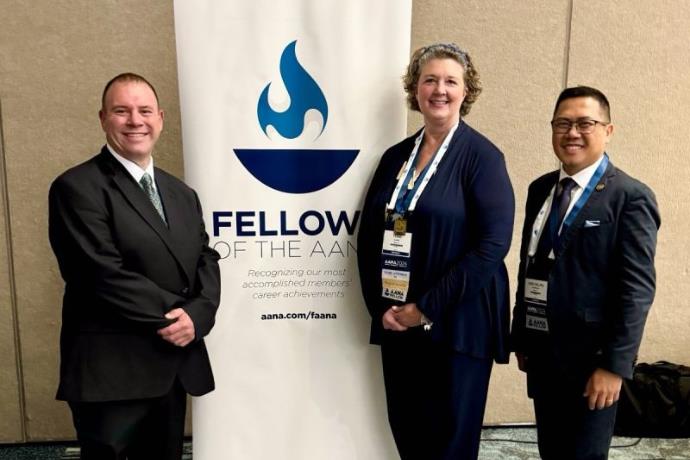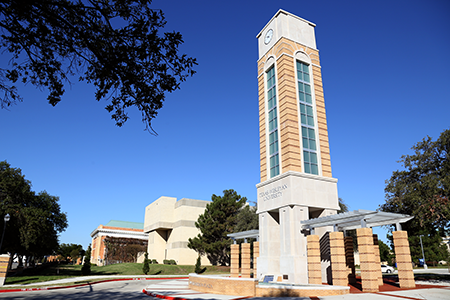GPNA Faculty Members Join the Fellows of the AANA

There is no doubt that nurses impact our community, often even going beyond providing direct care. From community outreach to influencing policy to teaching the next nurse anesthetists, nurses play a crucial role in shaping the health and well-being of our society. It is an even bigger impact that many of the nurse anesthetists who may treat those throughout the United States come from our own RAMily. Jose D. Castillo III, Assistant Professor of Nurse Anesthesia; Brian Cornelius, Assistant Professor of Nurse Anesthesia and Simulation Center Director and Terri D. Kane, Program Director and Professor of Nurse Anesthesia are all CRNAs dedicating their time to teaching nursing students to become life savers. Moments like these remind us of the service nurses provide to our community.
On Aug. 3, 2024, their efforts as CRNAs were recognized by the Fellows of the American Association of Nurse Anesthesiology (FAANA). These graduate program educators were honored by being designated Fellows of the American Association of Nurse Anesthesiology (AANA). “The RAMily has become a second home, not a place to work. The University fosters growth and development in faculty and residents alike. This recognition is a perfect example of the outcomes that are possible in the RAMily,” said Cornelius.
The award is granted to those rendering expertise, service, leadership, achievements and commitment to their profession. Castillo understands the values of leadership. He says,” As I guide our future leaders in Nurse Anesthesiology, I remain committed to instilling that leadership and advocacy are not just concepts but rather pillars where our collective dedication to protecting our profession ensures the continued advancement of Nurse Anesthesiology. It is all hands on deck.”
They were three of 49 individuals (less than 1% of CRNAs) to receive this recognition this year. “Being a member of FAANA is a tremendous honor. It validates that the hard work you put in is noticed and appreciated. All of us like that; especially when it comes from our peers,” said Kane.
The FAANA designation represents the pinnacle of leadership and professionalism in nurse anesthesiology, with fellows demonstrating exceptional commitment to advancing anesthesia care through clinical leadership, advocacy, research, innovation, and efforts to enhance safety and reduce health disparities. “Becoming a CRNA requires dedication, resilience, and a genuine passion for patient care and anesthesia. Ensure that you are pursuing this career for the right reasons and are prepared for the commitment it entails,” said Cornelius.
To be awarded the FAANA distinction, applicants must be a CRNA and AANA member for at least 10 years, have 10 years of full-time experience in relevant roles and have a record of attending AANA conferences. They must have notable achievements and leadership characteristics in nurse anesthesia, and evidence of significant professional growth and innovation. CRNAs are uniquely positioned to model those attributes when patients are at their most vulnerable.
Kane’s message to GPNA students is to “just do your best every day for anyone you meet. People appreciate hard work, kindness, and compassion.” These three were very thankful for this designation and inspired in their response to the students. “Our RAMily significantly impacted my academic and clinical career due to professional development to institutional support influencing my job satisfaction and work-life balance,” said Castillo. Texas Wesleyan is proud of these GPNA faculty members for receiving the most elite professional achievement in their field.








